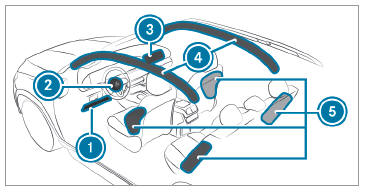Mercedes-Benz GLC 2016-2026 Owners Manual / Driving and parking / Driving / Notes on driving / Notes on driving through water on the road surface
Mercedes-Benz GLC : Notes on driving / Notes on driving through water on the road surface
Water which has entered into the vehicle can damage the engine, electrics and transmission.
Water can also enter the air intake of the engine and cause engine damage.
Observe the following if you must drive through water:
- Observe the maximum permissible fording depth.
- Drive at a maximum speed of 6 mph (10 km/h); water can otherwise enter the vehicle interior or engine compartment.
- Vehicles traveling in front, or oncoming vehicles, can create waves which may exceed the maximum permissible depth of the water.
The braking effect of the brakes is reduced after fording. Brake carefully while paying attention to the traffic conditions until braking power has been fully restored.
 Notes on hydroplaning
Notes on hydroplaning
Hydroplaning can take place once a certain
amount of water has accumulated on the road
surface.
Observe the following notes during heavy precipitation
or in conditions in which hydroplaning
may occur:
Reduce speed
Avoid tire ruts
Avoid sudden steering movements
Brake carefully
Also observe the notes on regularly checking
wheels and tires...
 Notes on off-road driving
Notes on off-road driving
WARNING Risk of accident if you do not
keep to line of fall on inclines
If you drive at an angle or turn on an incline,
the vehicle could slip sideways, tip and rollover...
Other information:
Mercedes-Benz GLC 2016-2026 Owners Manual: Locking/unlocking the driver's door with the emergency key
If you wish to lock the vehicle entirely using the emergency key, first press the button for locking from the inside while the driver's door is open. Then proceed to lock the driver's door using the emergency key. Remove the emergency key. Insert the emergency key as far as it will go into opening in the cover...
Mercedes-Benz GLC 2016-2026 Owners Manual: Navigation overview
..
Copyright © 2026 www.meglc.net


 Driver's knee airbag
Driver's knee airbag Driver's airbag
Driver's airbag